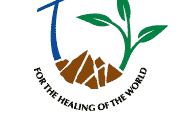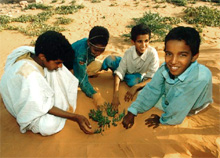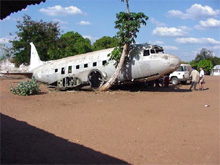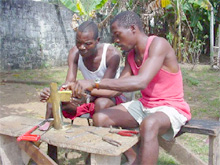






|
At
the Assembly Village Groups
Village Groups will be a central feature of the Assembly. They are the settings where Bible study discussions will occur, and where important implications of the Assembly theme will be pursued. Work in the Village Groups will develop the substance of the Assembly Message and commitments. Assembly participants will be asked to indicate their Village Group choices when they register. The Village
Group descriptions which appear below provide links to download the Assembly
Study Book material for each Village Group. (All
links require Adobe
Acrobat Reader.)
God's
Healing Gift of Justification With the signing of the Joint Declaration, renewed ecumenical attention is being given to the doctrine of justification. What is the relationship between justification, healing and `new creation'? In what ways is salvation as forgiveness of sin, liberation from bondage and spiritual healing especially needed today? How does this speak to people's deepest spiritual yearnings? What difference do factors such as context and gender make? How can congregations proclaim and live this out more fully? (TOP) God's
Healing Gift of Communion
Healing
Divisions within the One Church
God's Spirit is actively healing the Church. Although considerable progress has been made in ecumenical relations in recent years, the healing of old divisions must continue. How do we draw upon the meaning and power of the sacraments for Christian unity? New questions have arisen about the profile, identity and role of Lutherans in these ecumenical relations. New challenges also arise from Christians with whom we have not been in dialogue. How is the LWF involved and how might it be involved in new ecumenical pursuits? What are the difficult matters that must be addressed? Toward what ends? (TOP) The
Mission of the Church in
Multi-faith Contexts
The mission of the Church points to and participates in the coming of God's reign. How can every Christian and every congregation be empowered to participate in this mission? Reconciliation among people is a key aspect of this mission, especially in multi-faith contexts. How can this kind of healing occur through such means as dialogue and living and working together? How does this challenge and transform some past mission assumptions and practices? How should this be reflected in the revised mission document and in other LWF work? (TOP) Removing
Barriers that Exclude
In our churches and societies, barriers of discrimination continue to exclude people with physical or mental disabilities. Those affected by HIV/AIDS face additional kinds of discrimination. How do barriers of discrimination challenge what it means to be the church? How does Christ's transforming power break down these barriers, as well as those based on race, ethnicity, caste, age or gender? What should we be doing to remove them? Where should human rights efforts focus? The historical wounds of exclusion tend to be deep and festering. How can ruptured relationships with those who have been excluded be healed? (TOP) The
Church's Ministry of Healing
The healing of persons has long been considered part of the church's pastoral and diaconal calling. For Lutherans, the ministry of healing is grounded in the Word, sacraments and prayer. Some churches have focused on healing through prayer and exorcism, whereas others view these practices with suspicion. Most churches are involved in healing through various diaconal ministries. What have been the experiences in our churches, and what can we learn from each other? How is individual healing related to wider social issues? What is the difference between healing and curing? How should we as churches be addressing particular healing challenges in our world today? (TOP) Justice
and Healing in Families
How do we minister to families when they become places of injustice and pain? How does our faith speak to changing realities of family, gender and sexuality? Given the significant cultural and generational differences in how we understand family life and sexuality, how can we talk about and learn to live with these differences as part of the one household of God? (TOP) Overcoming
Violence
Violence -- in families, societies and between communities -- continues to inflict deep wounds, especially on women, children and youth. Conflict within and between countries devastates land and peoples. How is the God we know in Jesus Christ healing violence in our world today? How do we respond theologically to horrendous acts of violence? How can memories be healed and cycles of violence overcome? How can the member churches advocate with others, particularly through the `Decade to Overcome Violence,' for the sake of justice, peace and reconciliation? (TOP) Transforming
Economic Globalization
The powers of economic globalization reign over our world today as a theological challenge. Although some results are positive, injustices also increase, communities are fragmented and the earth is further exploited. How can we as a Lutheran communion of churches challenge and hold these powers more accountable to the vulnerable, especially through decisions and actions that can be taken? What diverse strategies are needed? Through the LWF study process, which commitments and steps will we take together with other ecumenical and civil society partners? How are individuals, congregations, and the member churches involved? (TOP) Healing
Creation Human beings have spoiled or destroyed much of God's good creation. How can creation be restored, and our relationships with the rest of nature healed? How is this related to sacramental understandings? What can other traditions teach us? What are the power and the responsibility of human creativity in relation to the rest of nature, including through the use of technologies? How far should efforts go to heal or improve human life? At what risk? What is at stake theologically? (TOP) [Site Map] [LWF Assembly Home] [Links] [LWF Home] |

|

 The communion we share as
Lutherans is a gift of God for the sake of the world. The healing
power of prayer and the Eucharist transforms us into a communion of
love. Yet, within this communion of churches, there still are
significant differences and wounds, related to significant historical struggles
and political changes (e.g., the end of Communism or apartheid),
generational and theological differences (e.g., who can be
ordained), ethnic or cultural identities, and disparities in size and
finances. Where are forgiveness, healing and
reconciliation especially needed in this communion? How can
communication support and build up the communion, for the sake of the
world?
The communion we share as
Lutherans is a gift of God for the sake of the world. The healing
power of prayer and the Eucharist transforms us into a communion of
love. Yet, within this communion of churches, there still are
significant differences and wounds, related to significant historical struggles
and political changes (e.g., the end of Communism or apartheid),
generational and theological differences (e.g., who can be
ordained), ethnic or cultural identities, and disparities in size and
finances. Where are forgiveness, healing and
reconciliation especially needed in this communion? How can
communication support and build up the communion, for the sake of the
world? 
